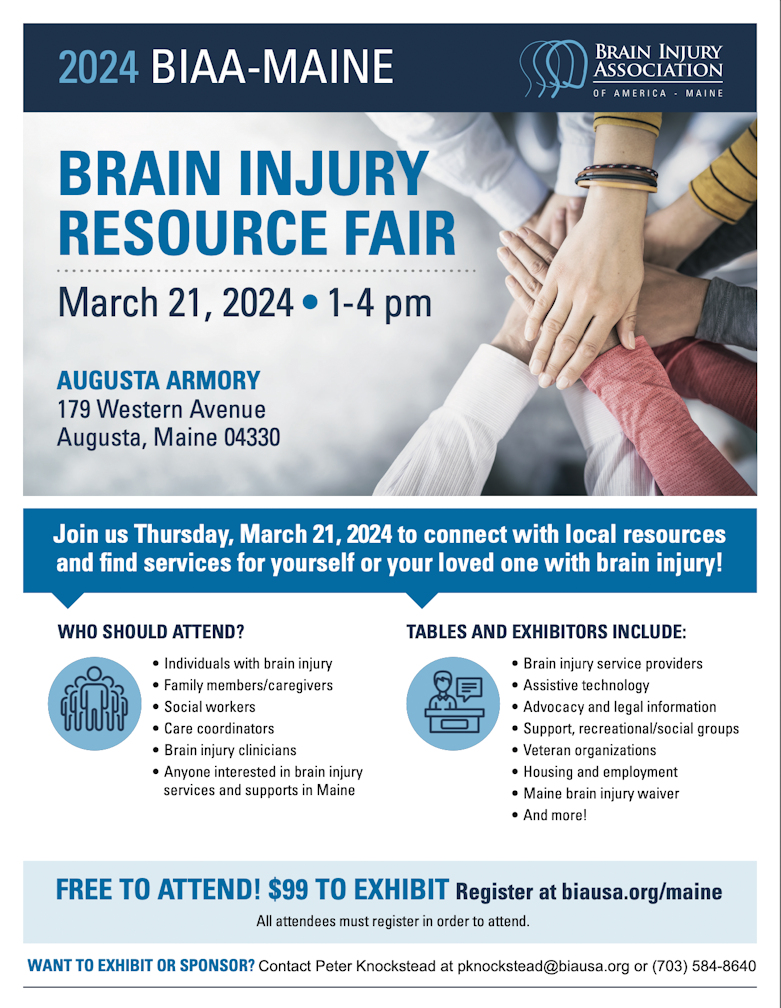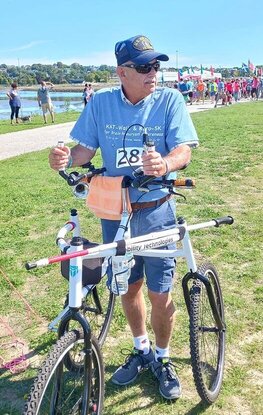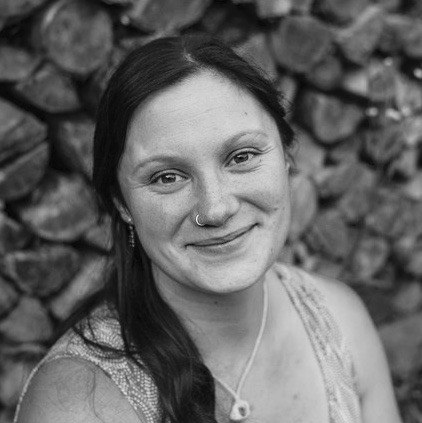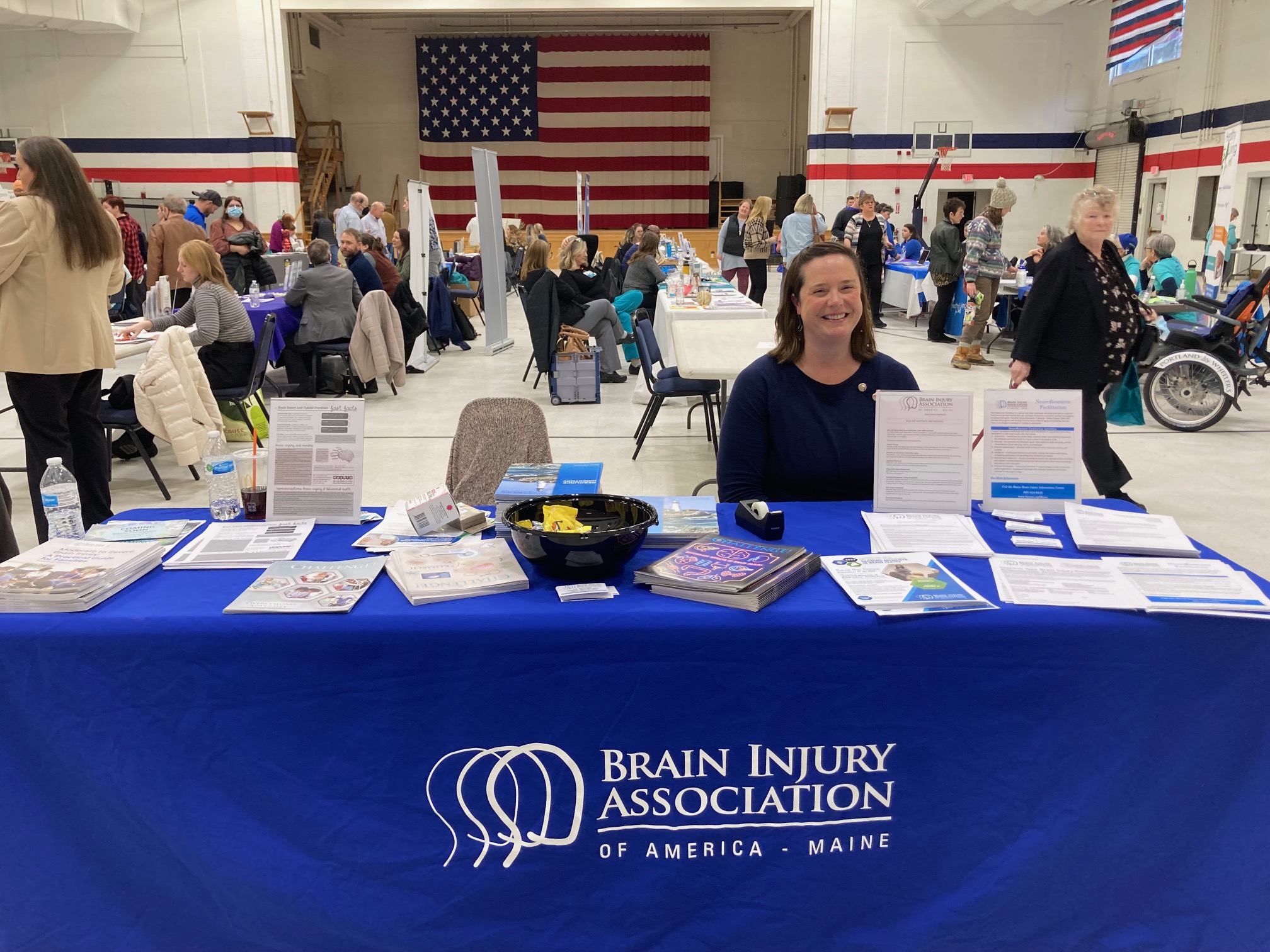The aftermath of a brain injury can be devastating and overwhelming. The Brain Injury Association of America – Maine Chapter helps survivors and families navigate this unchartered territory. Hannaford has supported this nonprofit organization through the Hannaford Helps Community Bag and Bloomin’ 4 Good Programs.
Tell us about the Brain Injury Association of America, Maine Chapter.
The Brain Injury Association of America – Maine Chapter (BIAA-ME) works to increase awareness of brain injury, provide information, resources, and support for individuals who have sustained brain injuries and their families, and advocate for prevention and improved funding and services across the state of Maine. The national BIAA was started by a group of family members and professionals in the early 80s, and the current Maine Chapter was established in 2014.
We really want them to know they are not alone on this journey.
BIAA-ME is here to help survivors and families navigate life after brain injury. We really want them to know they are not alone on this journey.
What services do you provide to the community?
We’re here to help folks navigate life after injury. Whether it’s due to a car accident, stroke, overdose, or any of numerous other causes, BIAA-ME is here to provide support and resources for survivors, family members, and professionals in the Maine brain injury community.
Anyone can call our 800 number (800-444-6443) and ask questions about brain injuries, resources, and support specific to the state of Maine. We also have a program called NeuroResource facilitation, a longer-term, one-on-one support someone can receive while navigating this. Very often, it’s not just the brain injury the individual is trying to manage, and it can’t be taken care of in a quick phone call, so longer-term support is sometimes necessary. These are free services; there is no cost for the person receiving them.
Anyone can call our 800 number (800-444-6443) and ask questions about brain injuries, resources, and support specific to the state of Maine.
Then, we also do a lot of different programming throughout the year. We have an annual resource fair in Augusta during Brain Injury Awareness Month (March 21, 2024 at the Augusta Armory this year), where folks come from all over the state to explore resources. We produce a FREE Maine Brain Injury & Stroke Resource Directory that is updated on an annual basis. We also have a yearly conference, educational training, and webinars.

In addition, we facilitate two statewide virtual brain injury support groups (one for brain injury caregivers and one for anyone impacted by brain injury), and we help support all the brain injury support groups across the state by acting as a connecting and supporting centerpiece for them, helping the facilitators, many of whom are brain injury survivors or family members. Peer support groups are so vital for survivors and caregivers—there is something magical about connecting with others who truly get it, and there is so much sharing of information, ideas, and resources within the groups. The camaraderie and friendship that develops among members is also very helpful in combatting isolation.
Peer support groups are so vital for survivors and caregivers—there is something magical about connecting with others who truly get it…
We’re also really trying to raise awareness around the overlap between brain injury and both mental health challenges and substance use disorder. There is huge overlap, and we want to make sure that everyone who needs resources around their brain injury receives support.
What sets Brain Injury Association of America, Maine Chapter apart from other nonprofits in your community?
We are specific to brain injury. There are a lot of great organizations providing resources out there throughout the state, but the brain injury journey is really unique. It’s often extremely sudden and very different than dealing with other illnesses or injuries. And it’s also often lifelong for folks in terms of symptom management and recovery. There’s frequently no timeline that can be given, which is a uniquely frustrating thing for survivors and family members. So, having resources tailored to brain injury can be so helpful as they’re navigating what’s out there.
We hope providing support and guidance through what can be a bewildering path makes a really big difference.
Especially with something so specific, you don’t know what you don’t know. Maine has much to offer regarding support and resources, but it’s sometimes a fragmented system. So, we work to bring that all together and say, here are the different resources; this is what’s in your neck of the woods; this is what might help. We hope providing support and guidance through what can be a bewildering path makes a really big difference.
Please tell us a story that illustrates the good work of your organization.
I have all these stories I would love to tell, but I want to share one in particular. As I mentioned, we hold the annual resource fair every year; it started in 2016, and it’s our big event for Brain Injury Awareness Month, which is in March. We try to get as many resources as possible in one place from around the state, and it’s free for folks to attend. They can just come and check out all the resources.
One of our advisory board members and volunteers, who is a survivor himself of multiple brain injuries, volunteered at one of the first annual resource fairs we held. He had been struggling a lot with balance, and that was affecting his overall health because exercise and movement were really challenging for him since he was unstable on his feet. So, he and his wife were wandering around and came across this three-wheel adaptive device that completely transformed his life. He’s now done 20+ 5Ks!

Even though he was an advisory board member for us and relatively exposed to different resources, this device was something he’d never seen before. It totally changed his life in the most amazing way. Just being at the event, finding that device and eventually getting one for himself made all the difference for him.
What is your most outstanding achievement or contribution to the community?
Our resource facilitation team is extraordinary. They’re available to assist survivors, family members, and professionals working with the Maine brain injury community, basically anyone who has questions or needs some resources regarding brain injury in Maine. And having that NeuroResource Facilitation where people can have longer-term support as they go through these challenges is an amazing thing. Having someone dedicated to helping you navigate and who knows you and what you’re going through, which can be overwhelming, is invaluable. These services are all offered at no cost as well.
Having someone dedicated to helping you navigate and who knows you and what you’re going through, which can be overwhelming, is invaluable.
What is the most important thing you want people to know about the Brain Injury Association of America, Maine Chapter?
The big thing is that we’re here to help. If someone has a brain injury or their loved one has a brain injury, and they’re not sure where to turn next, that’s what we’re here for. Please reach out to us. We’re here to help and make sure you’re not alone in this process.
How will you use the funds received from the Hannaford Helps Community Bag and Bloomin’ 4 Good Programs?
Right now, we’re planning to use the recently raised funds to offer scholarships to our annual conference for Maine’s brain injury support groups and their members. Our conference has sessions for survivors and caregivers in addition to professionals, and we want to reduce barriers for more survivors and family members to be able to attend.
Is there anything you’d like to add?
For assistance with Maine brain injury information, resources, or support, please call the Maine Brain Injury Information Helpfile at 1-800-444-6443 to speak with someone from our resource facilitation team. You can also go to our website for more information at www.biausa.org/maine. We are here to help!
We would also love to see you at the 2024 BIAA-ME Brain Injury Resource Fair on March 21, 2024, 1-4 pm, at the Augusta Armory! The fair is FREE to attend and is open to survivors, family members/caregivers, professionals, and anyone else interested in learning more about Maine brain injury resources, services, and supports. You can register to attend the event here (www.biausa.org/maine24) or head to our website for more information: www.biausa.org/maine.

Interview with Sarah K. Gaffney, Program Coordinator, Brain Injury Association of America, Maine Chapter.
Published February 20, 2024.
